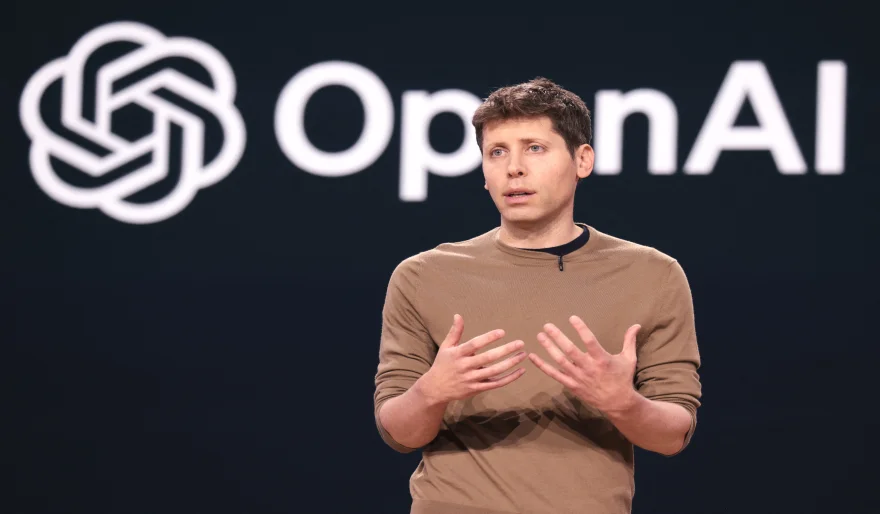Stay Ahead of the Curve
Latest AI news, expert analysis, bold opinions, and key trends — delivered to your inbox.
Sam Altman’s Vision for AI in 2035: Progress or Precipice?
6 min read Sam Altman predicts that by 2035, a single AI data center could surpass the intelligence of all humans + AI today. A game-changer for innovation, jobs, and society—but also a potential disruption. Progress or peril? February 10, 2025 16:37
Sam Altman, CEO of OpenAI, has recently shared his predictions about the trajectory of artificial intelligence, focusing on the year 2035. His statements have sparked both excitement and apprehension, raising fundamental questions about AI’s role in shaping the future of society, economics, and global policy.
The Future of AI: Key Highlights.
Altman’s vision for AI revolves around several groundbreaking advancements:
-
Intellectual Capacity: By 2035, a single AI data center could match or surpass the combined intellectual capacity of all humans and AI systems today. This suggests a transformative leap in AI’s cognitive abilities, potentially leading to breakthroughs in automation, creativity, and problem-solving.
-
Algorithmic Advancements: Recent insights indicate that AI algorithms are becoming increasingly adept at learning autonomously. This could signal steady progress toward Artificial General Intelligence (AGI)—an AI system with human-like reasoning capabilities.
-
Societal Adjustments: Altman has hinted at the need for a re-evaluation of societal structures in response to AI’s progress. This could involve shifts in labor markets, economic models, and governance structures as AI becomes more integrated into daily life.
-
Global Expansion: OpenAI’s push for AI development beyond the United States, including initiatives like the "Stargate-like" project in Europe, reflects the increasing global footprint of AI technology.
-
Workforce Implications: Predictions suggest that AI could enter the workforce as early as 2025, serving as a precursor to the more advanced AI systems envisioned for 2035. The extent of AI’s role in employment remains a subject of debate.
-
Policy Engagement: Altman’s interactions with policymakers, including closed-door discussions with U.S. government officials, highlight the ongoing regulatory and strategic considerations surrounding AI’s development.
Diverse Perspectives on AI’s Future.
As with any technological revolution, reactions to Altman’s predictions vary across political, ideological, and economic lines. Here’s an overview of key perspectives:
Concerns from the Left
- Job Security & Economic Stability: There is growing concern that AI-driven automation could lead to widespread job displacement. Calls for universal basic income (UBI) and social safety nets are gaining traction as potential solutions.
- Ethical and Privacy Considerations: Issues like algorithmic bias, data privacy, and AI surveillance are frequently raised. Advocates push for strict AI regulations to ensure technology serves the public good.
- Environmental Impact: The energy consumption of large-scale AI data centers is a major concern. Sustainable AI development, powered by renewable energy, is seen as a necessary step.
Optimism from the Right
- Economic Growth & Innovation: AI is viewed as a catalyst for economic expansion, fostering entrepreneurship and new business models. Calls for minimal regulatory intervention emphasize allowing market forces to guide AI’s evolution.
- National Security & Geopolitical Strategy: AI’s potential role in defense and intelligence is a priority. Some argue that maintaining a technological edge is crucial to national security, particularly in competition with global powers like China.
- Limited Government Oversight: Concerns exist about excessive government control stifling innovation. Many advocate for a free-market approach where private sector advancements lead the way.
Centrist & Pragmatic Approaches
- Balanced Regulation: Many advocate for measured policies that encourage innovation while mitigating risks. AI ethics boards and international cooperation on AI governance are frequently discussed solutions.
- Workforce Adaptation: Calls for reskilling programs and educational reforms to prepare the workforce for an AI-driven economy are central to centrist discussions.
- Public-Private Partnerships: Collaborative efforts between governments, academia, and tech firms are viewed as essential for ensuring AI develops in a way that benefits society as a whole.
The Broader Public Sentiment.
Reactions to Altman’s AI vision among the general public are diverse. Social media discussions reflect a mix of optimism, fear, and skepticism:
- Excitement: Some see AI as a revolutionary tool that could address global challenges, from medical breakthroughs to climate change solutions.
- Apprehension: Others worry about AI’s potential risks, including existential threats, ethical dilemmas, and unforeseen consequences.
- Overwhelm & Uncertainty: Many feel left behind by the rapid pace of technological advancements, questioning how AI will reshape their livelihoods and daily lives.
Looking Ahead: An Uncertain Yet Transformative Future.
Altman’s predictions offer a glimpse into a future where AI could fundamentally reshape civilization. Whether this transformation leads to an era of unprecedented prosperity or presents new societal challenges remains an open question.
As AI progresses, a careful balance between innovation, regulation, and ethical responsibility will be necessary to ensure its benefits are widely shared while mitigating potential risks. How the world responds to these developments in the coming years may determine whether AI serves as a force for collective advancement or becomes a disruptive force requiring urgent intervention.



















 AI Agents
AI Agents